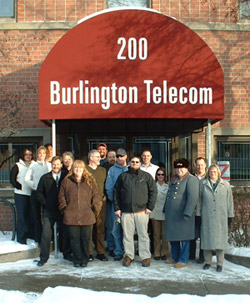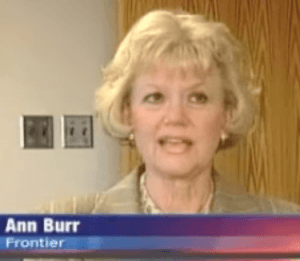
Fool me once... can't get fooled again!
After astroturfing their way to a statewide video franchising bill in 2007 that made AT&T millions and saved consumers nothing, the company is back again looking for more legislative goodies from the Wisconsin legislature.
This time, they want near-total deregulation of their landline telephone business. The reason? Their overpriced, uninspired service has caused 50 percent of their customers to disconnect, preferring to rely on cable “digital phone” products, cell phones, or Voice Over IP services like MagicJack or Vonage. AT&T has succeeded in driving away so many of their customers, the company is left with just 675,000 landlines in the entire state.
The answer? Deregulation!
Of course, no regulation prevents AT&T from investing in Wisconsin to win back their former customers with better service at lower prices.
AT&T apparently feels it can’t compete tied down with state consumer protection rules and those ‘oversight pests’ that make sure the company lives up to appropriate service standards.
This time, like last time, your legislative cruise director is Sen. Jeff Plale (D-South Milwaukee), a chief sponsor of Senate Bill 469, along with most of the Republican party in the state legislature. Plale’s a special case in point — a very grateful recipient of AT&T campaign cash, and he’s no stranger to the phone giant. In 2007, Plale accepted $1,000, the maximum allowed, from AT&T just a week before introducing the aforementioned statewide video franchising bill. But the check from AT&T’s PAC is always just the start of the Money Party, because AT&T executives and their spouses also joined the conga line of campaign contributions on their own, spreading around money to Republican and Democratic legislators and the governor.
“It [was] impossible [in 2007] to not see the connection” between AT&T’s campaign cash and its push for the deregulation bill, Mike McCabe, executive director of the non-profit Wisconsin Democracy Campaign, which monitors campaign donations, told the Milwaukee Journal-Sentinel.
AT&T’s campaign gifts starting in 2007 were also unusual because company officials had not been “particularly active” givers prior to the video franchising bill, McCabe said. “The giving is targeted.”
It still is.
The Big Money Blog, covering the atrocities committed by Wisconsin legislators hungry for campaign cash, reports that those who played along with AT&T got rewarded handsomely with contributions. Those who voted no had their contribution checks reduced or cut out altogether.
Of course Plale can’t see the connection, probably because all that money is blocking his view. He told the newspaper he had no idea why AT&T would max out their contribution to his campaign, despite only getting a fraction of that amount prior to the introduction of the video franchise bill.
Who does he think he’s kidding?
He’s got plenty of nerve to be back asking for more “legislative relief” just a few weeks after the verdict is in for the video franchising “competition” bill that was supposed to save Wisconsin consumers money. It didn’t. In fact, the rate increases just kept on coming. While I’m sure that provided financial relief to AT&T, consumers gained little, if anything.
The reaction among the elected officials who promised all those savings? Mild surprise and disappointment — a veritable ‘shucky darn’ and shrug of the shoulders.
The Milwaukee Journal-Sentinel reports consumer groups are outraged.
They worried that less regulation could lead to less investment in the companies’ infrastructure.
That’s critical, said Charlie Higley, executive director of the Citizens Utility Board, because competitors of AT&T and other local phone companies often rent portions of the network and sell their own services over it.
He said freer oversight would allow local phone companies to hide financial information and “evade appropriate regulation.”
Union representatives also were critical of the legislation, saying that deregulation steadily has driven down employment in the industry.
Despite that, Plale and most of the Republicans are in for a penny, in for a pound with AT&T.
Professor of telecommunications at the University of Wisconsin Barry Orton looked through the notes on how the bill was drafted and discovered all of the requests and language came from telecommunications industries. There was absolutely zero consumer input in the bill.
Color me surprised. We’ve watched telecommunications companies in North Carolina custom-write legislation and find elected officials more than happy to get such legislation introduced, especially when campaign contributions smooth the way. In Kansas, negotiations between legislators and company officials appear to have been conducted in secret, with charges from consumer groups that legislators withheld meeting notes.
Despite the evidence these AT&T-sponsored bills don’t help consumers, Plale carries on. He argues the bill is needed because telecommunications services are evolving too fast to ‘shackle companies with outdated regulations.’

Back for a second helping from the Wisconsin Legislative Buffet
“The 1930s models have outlived its usefulness,” he said.
Perhaps his constituents will think the same about him after their phone bills go up as quickly as their cable bills.
If the legislation doesn’t work out for you, Plale suggests you simply “switch providers.” “[Customers] can switch to Verizon, or Sprint or Time Warner,” he said after a recent hearing on the measure. “It’s really not an issue anymore.”
Really? What about the tens of thousands of rural Wisconsin residents that depend on AT&T for telephone and broadband service? They don’t enjoy good reception from cell phone providers and cable television is an idea that will never come to their rural neighborhoods. Plale can afford to pay the premium prices cell phone companies charge (AT&T should just give him a free phone). Many cash-strapped consumers in his state cannot.
Unfortunately for rural Wisconsin, their only choice will likely be AT&T for some time to come. For those consumers stuck with one choice, it’s not comforting to know Plale’s bill makes sure the state government can’t intervene when your phone line goes out, your bill is wrong, or you can’t get service installed.
Orton warns passing AT&T’s deregulation bill will leave the phone company essentially unregulated. He told the Badger Herald phone companies would be less accountable under the bill, leaving the state ill-equipped to be sure all rural areas of the state were provided with adequate service.
“The phone companies argue that because of competition, they shouldn’t have regulation anymore,” Orton told the newspaper. “[They also argue] if consumers don’t like their service, they can go to another provider. But the problem is that in some places there aren’t any more providers.”
You really couldn’t do worse as a legislator than to openly admit your hand is wide open to receive AT&T campaign contributions while you advocate against the best interests of your own constituents. It doesn’t get more shameful than that.
If you live in Wisconsin, get on the phone with your representatives in the State Assembly and Senate and tell them in no uncertain terms you oppose the giveaway deregulation bill for AT&T. Let them know you’re watching their vote closely, particularly after the 2007 statewide video franchise bill debacle made sure you were left with less money in your wallet than before they passed it.
 Even worse, many online video providers like Hulu are considering charging viewers their own fees, leaving consumers paying three times – twice in money for broadband service and a subscription fee, once in time wasted sitting through unstoppable ads.
Even worse, many online video providers like Hulu are considering charging viewers their own fees, leaving consumers paying three times – twice in money for broadband service and a subscription fee, once in time wasted sitting through unstoppable ads.

 Subscribe
Subscribe











